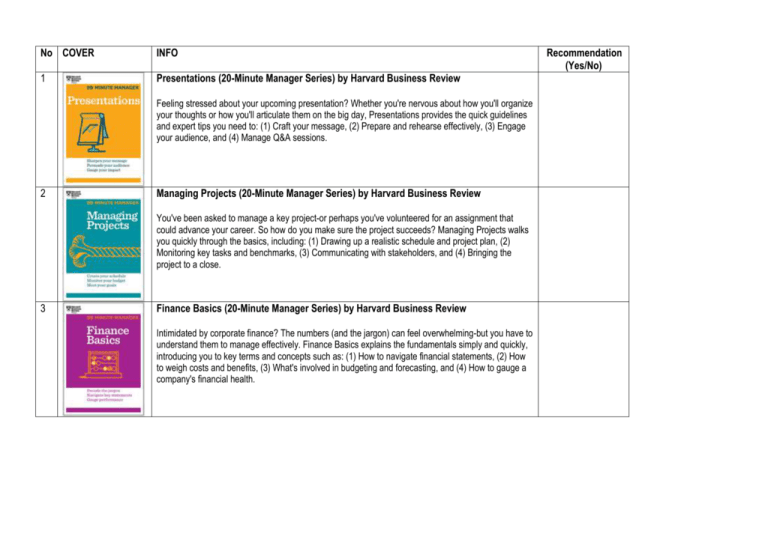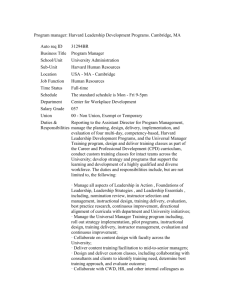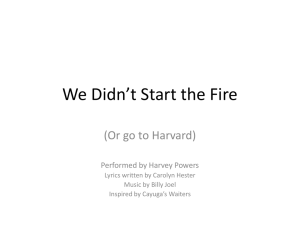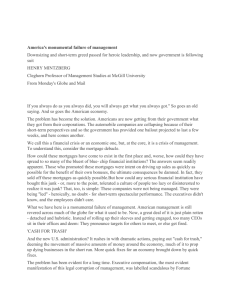No COVER INFO Recommendation (Yes/No) 1 Presentations (20
advertisement

No COVER INFO 1 Presentations (20-Minute Manager Series) by Harvard Business Review Feeling stressed about your upcoming presentation? Whether you're nervous about how you'll organize your thoughts or how you'll articulate them on the big day, Presentations provides the quick guidelines and expert tips you need to: (1) Craft your message, (2) Prepare and rehearse effectively, (3) Engage your audience, and (4) Manage Q&A sessions. 2 Managing Projects (20-Minute Manager Series) by Harvard Business Review You've been asked to manage a key project-or perhaps you've volunteered for an assignment that could advance your career. So how do you make sure the project succeeds? Managing Projects walks you quickly through the basics, including: (1) Drawing up a realistic schedule and project plan, (2) Monitoring key tasks and benchmarks, (3) Communicating with stakeholders, and (4) Bringing the project to a close. 3 Finance Basics (20-Minute Manager Series) by Harvard Business Review Intimidated by corporate finance? The numbers (and the jargon) can feel overwhelming-but you have to understand them to manage effectively. Finance Basics explains the fundamentals simply and quickly, introducing you to key terms and concepts such as: (1) How to navigate financial statements, (2) How to weigh costs and benefits, (3) What's involved in budgeting and forecasting, and (4) How to gauge a company's financial health. Recommendation (Yes/No) 4 Managing Up (20-Minute Manager Series) by Harvard Business Review Your boss plays an important role in your career. So how do you navigate this delicate, significant professional relationship without playing political games or compromising your character? Managing Up offers concise, expert tips on: (1) Understanding your manager's priorities and pressures, (2) Setting a positive tone for the relationship, (3) Managing expectations--and egos, and (4) Earning trust and respect. 5 HBR Guide to Managing Stress at Work by Harvard Business Review Are you suffering from work-related stress? Feeling overwhelmed, exhausted, and short-tempered at work--and at home? Then you may have too much stress in your life. Stress is a serious problem that impacts not only your mental and physical health, but also your loved ones and your organization. So what can you do to address it? The "HBR Guide to Managing Stress at Work" will help you find a sustainable solution. It will help you reach the goal of getting on an even keel--and staying there. You'll learn how to: (1) Harness stress so it spurs, not hinders, productivity, (2) Create realistic and manageable routines, (3) Aim for progress, not perfection, (4) Make the case for a flexible schedule, (5) Ease the physical tension of spending too much time at your computer, and (6) Renew yourself physically, mentally, and emotionally. 6 Big Data at Work by Thomas H. Davenport Go ahead, be skeptical about big data. The author was--at first. When the term "big data" first came on the scene, bestselling author Tom Davenport ("Competing on Analytics," "Analytics at Work") thought it was just another example of technology hype. But his research in the years that followed changed his mind. Now, in clear, conversational language, Davenport explains what big data means--and why everyone in business needs to know about it. "Big Data at Work" covers all the bases: what big data means from a technical, consumer, and management perspective; what its opportunities and costs are; where it can have real business impact; and which aspects of this hot topic have been oversold. This book will help you understand: (1) Why big data is important to you and your organization, (2) What technology you need to manage it, (3) How big data could change your job, your company, and your industry, (4) How to hire, rent, or develop the kinds of people who make big data work, (5) The key success factors in implementing any big data project, and (6) How big data is leading to a new approach to managing analytics. With dozens of company examples, including UPS, GE, Amazon, United Healthcare, Citigroup, and many others, this book will help you seize all opportunities--from improving decisions, products, and services to strengthening customer relationships. It will show you how to put big data to work in your own organization so that you too can harness the power of this ever-evolving new resource. 7 How I Did It: Lessons from the Front Lines of Business by Harvard Business Review Powerful stories from the world's top CEOs to help prepare you for the hard decisions ahead. The essays in "How I Did It" teach and inspire. Pulled directly from the pages of one of the most popular columns in "Harvard Business Review," these essays offer firsthand accounts of the most difficult management challenges faced by the men and women who occupy the corner office. It's the next best thing to sitting down and talking face-to-face with these corporate leaders. You'll hear from renowned global leaders including: Kevin Ryan, Gilt Groupe; Mindy Grossman, HSN; Kevin Plank, Under Armour; Daniel P. Amos, Aflac; Pramod Bhasin, Genpact; Eric Schmidt, Google; Ellen Kullman, DuPont; Patrizio Bertelli, Prada; Pierre Omidyar, Omidyar Network; Jorge Cauz, Encyclopaedia Brittanica; Richard Gelfond, IMAX. Let these potent stories of strategic thinking--and often bold and unconventional action--be your guide as you step into your own future as a leader. 8 The First 90 Days, Updated and Expanded by Michael D. Watkins The world's most trusted guide for leaders in transition. Transitions are a critical time for leaders. In fact, most agree that moving into a new role is the biggest challenge a manager will face. While transitions offer a chance to start fresh and make needed changes in an organization, they also place leaders in a position of acute vulnerability. Missteps made during the crucial first three months in a new role can jeopardize or even derail your success. In this updated and expanded version of the international bestseller "The First 90 Days," Michael D. Watkins offers proven strategies for conquering the challenges of transitions--no matter where you are in your career. Watkins, a noted expert on leadership transitions and adviser to senior leaders in all types of organizations, also addresses today's increasingly demanding professional landscape, where managers face not only more frequent transitions but also steeper expectations once they step into their new jobs. By walking you through every aspect of the transition scenario, Watkins identifies the most common pitfalls new leaders encounter and provides the tools and strategies you need to avoid them. You'll learn how to secure critical early wins, an important first step in establishing yourself in your new role. Each chapter also includes checklists, practical tools, and self-assessments to help you assimilate key lessons and apply them to your own situation. Whether you're starting a new job, being promoted from within, embarking on an overseas assignment, or being tapped as CEO, how you manage your transition will determine whether you succeed or fail. Use this book as your trusted guide. 9 Playing to Win: How Strategy Really Works by A.G. Lafley, Roger L. Martin This is A.G. Lafley's guidebook. Shouldn't it be yours as well? Winning CEO A.G. Lafley is now back at the helm of consumer goods giant Procter & Gamble. If you want to know the strategy he'll use to restore P&G to its former dominance--read this book. "Playing to Win," a noted "Wall Street Journal" and "Washington Post" bestseller, outlines the strategic approach Lafley, in close partnership with strategic adviser Roger Martin, used to double P&G's sales, quadruple its profits, and increase its market value by more than $100 billion when Lafley was first CEO (he led the company from 2000 to 2009). The book shows leaders in any type of organization how to guide everyday actions with larger strategic goals built around the clear, essential elements that determine business success--where to play and how to win. The stories of how P&G repeatedly won by applying this method to iconic brands such as Olay, Bounty, Gillette, Swiffer, and Febreze clearly illustrate how deciding on a strategic approach--and then making the right choices to support it--makes the difference between just playing the game and actually winning. Let this book serve as your playbook for winning. 10 Primal Leadership, With a New Preface by the Authors by Daniel Goleman, Richard Boyatzis, Annie McKee This is the book that established "emotional intelligence" in the business lexicon--and made it a necessary skill for leaders. Managers and professionals across the globe have embraced "Primal Leadership," affirming the importance of emotionally intelligent leadership. Its influence has also reached well beyond the business world: the book and its ideas are now used routinely in universities, business and medical schools, and professional training programs, and by a growing legion of professional coaches. This refreshed edition, with a new preface by the authors, vividly illustrates the power--and the necessity--of leadership that is self-aware, empathic, motivating, and collaborative in a world that is ever more economically volatile and technologically complex. It is even timelier now than when it was originally published. From bestselling authors Daniel Goleman, Richard Boyatzis, and Annie McKee, this groundbreaking book remains a must-read for anyone who leads or aspires to lead. 11 HBR Guide to Getting the Mentoring You Need by Harvard Business Review Find the right person to help supercharge your career. Whether you're eyeing a specific leadership role, hoping to advance your skills, or simply looking to broaden your professional network, you need to find someone who can help. Wait for a senior manager to come looking for you--and you'll probably be waiting forever. Instead, you need to find the mentoring that will help you achieve your goals. Managed correctly, mentoring is a powerful and efficient tool for moving up. The "HBR Guide to Getting the Mentoring You Need" will help you get it right. You'll learn how to: (1) Find new ways to stand out in your organization, (2) Set clear and realistic development goals, (3) Identify and build relationships with influential sponsors, (4) Give back and bring value to mentors and senior advisers, and (5) Evaluate your progress in reaching your professional goals. 12 HBR Guide to Persuasive Presentations Ebook + Video Case Study by Nancy Duarte TAKE THE PAIN OUT OF PRESENTATIONS. Terrified of speaking in front of a group? Or simply looking to polish your skills? No matter where you are on the spectrum, this guide will give you the confidence and the tools you need to get results. Written by presentation expert Nancy Duarte, the "HBR Guide to Persuasive Presentations" will help you: (1) Win over tough crowds, (2) Organize a coherent narrative, (3) Create powerful messages and visuals, (4) Connect with and engage your audience, (5) Show people why your ideas matter to them, and (6) Strike the right tone, in any situation. Available exclusively through HBR.org: Ebook + Video! Purchase of the "HBR Guide to Persuasive Presentations" ebook includes a 20-minute video case study. This video features author Nancy Duarte walking you through tips covered in the Guide and is available to download (as an mp4 file) or to stream online. Duarte uses a former client, Alta Devices, to clearly illustrate how you can apply the techniques discussed in her book. Get it now--this Ebook + Video is available only through HBR.org. 13 HBR Guide to Better Business Writing by Bryan A. Garner DON'T LET YOUR WRITING HOLD YOU BACK. When you're fumbling for words and pressed for time, you might be tempted to dismiss good business writing as a nicety. But it's a skill you must cultivate to succeed: You'll lose time, money, and influence if your e-mails, proposals, and other important documents fail to win people over. The "HBR Guide to Better Business Writing," by writing expert Bryan A. Garner, gives you the tools you need to express your ideas clearly and persuasively so clients, colleagues, stakeholders, and partners will get behind them. This book will help you: (1) Push past writer's block, (2) Grab--and keep--readers' attention, (3) Earn credibility with tough audiences, (4) Trim the fat from your writing, (5) Strike the right tone, and (6) Brush up on grammar, punctuation, and usage. 14 HBR Guide to Managing Up and Across by Harvard Business Review ARE YOUR WORKING RELATIONSHIPS WORKING AGAINST YOU? To achieve your goals and get ahead, you need to rally people behind you and your ideas. But how do you do that when you lack formal authority? Or when you have a boss who gets in your way? Or when you're juggling others' needs at the expense of your own? By managing up, down, and across the organization. Your success depends on it, whether you're a young professional or an experienced leader. The "HBR Guide to Managing Up and Across" will help you: (1) Advance your agenda--and your career--with smarter networking, (2) Build relationships that bring targets and deadlines within reach, (3) Persuade decision makers to champion your initiatives, (4) Collaborate more effectively with colleagues, (5) Deal with new, challenging, or incompetent bosses, and (6) Navigate office politics. 15 HBR Guide to Project Management by Harvard Business Review MEET YOUR GOALS--ON TIME AND ON BUDGET. How do you rein in the scope of your project when you've got a group of demanding stakeholders breathing down your neck? And map out a schedule everyone can stick to? And motivate team members who have competing demands on their time and attention? Whether you're managing your first project or just tired of improvising, this guide will give you the tools and confidence you need to define smart goals, meet them, and capture lessons learned so future projects go even more smoothly. The "HBR Guide to Project Management" will help you: (1) Build a strong, focused team, (2) Break major objectives into manageable tasks, (3) Create a schedule that keeps all the moving parts under control, (4) Monitor progress toward your goals, (5) Manage stakeholders' expectations, and (6) Wrap up your project and gauge its success. 16 HBR's 10 Must Reads on Managing Yourself by Harvard Business Review The path to your own professional success starts with a critical look in the mirror. What you see there-your greatest strengths and deepest values--are the foundations you must build on. We've combed through hundreds of Harvard Business Review articles on managing yourself and selected the most important ones to help you stay engaged and productive throughout your working life. 17 HBR's 10 Must Reads on Leadership by Harvard Business Review How can you transform yourself from a good manager into an extraordinary leader? We've combed through hundreds of Harvard Business Review articles on leadership and selected the most important ones to help you maximize your own and your organization's performance. 18 HBR's 10 Must Reads on Strategy by Harvard Business Review Is your company spending enormous time and energy on strategy development, with little to show for your efforts? We've combed through hundreds of Harvard Business Review articles on strategy and selected the most important ones to help galvanize your organization's strategy development and execution. 19 HBR's 10 Must Reads: The Essentials by Harvard Business Review If you read nothing else, read these 10 articles from HBR's most influential authors: 1) "Meeting the Challenge of Disruptive Change," by Clayton M. Christensen and Michael Overdorf, explains why so few established companies innovate successfully. 2) "Competing on Analytics," by Thomas H. Davenport, explains how to use data-collection technology and analysis to discern what your customers want, how much they're willing to pay, and what keeps them loyal. 3) "Managing Oneself," by Peter F. Drucker, encourages us to carve our own paths by asking questions such as, "What are my strengths?" and "Where do I belong?" 4) "What Makes a Leader?" Not IQ or technical skills, says Daniel Goleman, but emotional intelligence. 5) "Putting the Balanced Scorecard to Work," by Robert S. Kaplan and David P. Norton, includes practical steps and examples from companies that use the balanced scorecard to measure performance and set strategy. 6) "Innovation: The Classic Traps," by Rosabeth Moss Kanter, advocates applying lessons from past failures to your innovation efforts. She explores four problems and offers remedies for each. 7) "Leading Change: Why Transformation Efforts Fail," by John P. Kotter, argues that transformation is a process, not an event. It takes years, not weeks, and you can't skip any steps. 8) "Marketing Myopia," by Theodore Levitt, introduces the quintessential strategy question, "What business are you really in?" 9) "What Is Strategy?" by Michael E. Porter, argues that rivals can easily copy your operational effectiveness, but they can't copy your strategic positioning-what distinguishes you from all the rest. 10) "The Core Competence of the Corporation," by C.K. Prahalad and Gary Hamel, argues that a diversified company is like a tree: the trunk and major limbs its core products, branches its business units, leaves and fruit its end products. Nourishing and stabilizing everything is the root system: its core competencies. 20 HBR's 10 Must Reads on Change Management by Harvard Business Review 70% of all change initiatives fail. But the odds turn in your company's favor once you understand that change is a multi-stage process--not an event--and that persuasion is key to establishing a sense of urgency, winning support, and silencing naysayers. We've combed through hundreds of Harvard Business Review articles on change management and selected the most important ones to help you lead your organization through transformation. 21 Leading Change, With a New Preface by the Author by John P. Kotter Named one of the twenty-five most influential business-management books by TIME.com. The international bestseller--now with a new preface by the author. Millions worldwide have read and embraced John Kotter's ideas on change management and leadership. "Leading Change" is widely recognized as his seminal work on leading transformational change, and is an important precursor to his newer ideas on acceleration: effectively managing operations while seizing new opportunity. Needed more today than at any time in the past, this immensely relevant book serves as both a visionary guide and a practical toolkit on how to approach the difficult yet crucial work of leading change in any type of organization. Freshly designed and with new commentary by John Kotter, "Leading Change" is a true leadership classic. 22 A Sense of Urgency by John P. Kotter Most organizational change initiatives fail spectacularly (at worst) or deliver lukewarm results (at best). In his international bestseller "Leading Change," John Kotter revealed why change is so hard, and provided an actionable, eight-step process for implementing successful transformations. The book became the change bible for managers worldwide. Now, in "A Sense of Urgency," Kotter shines the spotlight on the crucial first step in his framework: creating a sense of urgency by getting people to actually see and feel the need for change. Why focus on urgency? Without it, any change effort is doomed. Kotter reveals the insidious nature of complacency in all its forms and guises. In this exciting new book, Kotter explains: (1) How to go beyond "the business case" for change to overcome the fear and anger that can suppress urgency, (2) Ways to ensure that your actions and behaviors--not just your words--communicate the need for change, and (3) How to keep fanning the flames of urgency even after your transformation effort has scored some early successes. Written in Kotter's signature no- nonsense style, this concise and authoritative guide helps you set the stage for leading a successful transformation in your company. 23 What You're Really Meant to Do by Robert Steven Kaplan How do you create your own definition of success--and reach your unique potential? Building a fulfilling life and career can be a daunting challenge. It takes courage and hard work. Too often, we charge down a path leading to "success" as defined by those around us--and ultimately, are left feeling dissatisfied. Each of us is unique and brings distinctive skills and qualities to any situation. So why is it that most of us fail to spend sufficient time learning to understand ourselves and creating our own definition of success? The truth is, it can seem so natural and so much easier to just do what everyone else is doing--for now--leaving it for later to develop our best selves and figure out our own unique path. Is there a road map that will enable you to defy conventional wisdom, resist peer pressure, and carve out a path that fits your unique skills and passions? Harvard Business School's Robert Steven Kaplan, leadership expert and author of the highly successful book "What to Ask the Person in the Mirror," regularly advises executives and students on how to tackle these questions. In this indispensable new book, Kaplan shares a specific and actionable approach to defining your own success and reaching your potential. Drawing on his years of experience, Kaplan proposes an integrated plan for identifying and achieving your goals. He outlines specific steps and exercises to help you understand yourself more deeply, take control of your career, and build your capabilities in a way that fits your passions and aspirations. Are you doing what you're really meant to do? If you're ready to face this question, this book can help you change your life. 24 Reinventing You by Dorie Clark A step-by-step guide to reinventing you… Are you where you want to be professionally? Whether you want to advance faster at your present company, change jobs, or make the jump to a new field entirely, the goal is clear: to build a career that thrives on your unique passions and talents. But to achieve this in today's competitive job market, it's almost certain that at some point you'll need to reinvent yourself professionally. Consider this book your road map for the next phase of your career journey. In "Reinventing You," branding expert Dorie Clark provides a step-by-step guide to help you assess your unique strengths, develop a compelling personal brand, and ensure that others recognize the powerful contribution you can make. Mixing personal stories with engaging interviews and examples from wellknown personalities--Mark Zuckerberg, Al Gore, Tim Ferriss, Seth Godin, and others--"Reinventing You" shows how to think big about your professional goals, take control of your career, build a reputation that opens doors for you, and finally live the life you want. 25 Forget a Mentor, Find a Sponsor by Sylvia Ann Hewlett Who's pulling for you? Who's got your back? Who's putting your hat in the ring? Odds are this person is not a mentor but a sponsor. Mentors can build your self-esteem and provide a sounding board--but they're not your ticket to the top. If you're interested in fast-tracking your career, what you need is a sponsor--a senior-level champion who believes in your potential and is willing to advocate for you as you pursue that next raise or promotion. In this powerful yet practical book, economist and thought leader Sylvia Ann Hewlett--author of ten critically acclaimed books, including the groundbreaking "OffRamps and On-Ramps"--shows why sponsors are your proven link to success. Mixing solid data with vivid real-life narratives, Hewlett reveals the "two-way street" that makes sponsorship such a strong and mutually beneficial alliance. The seven-step map at the heart of this book allows you to chart your course toward your greatest goals. Whether you're looking to lead a company or drive a community campaign, "Forget a Mentor, Find a Sponsor" will help you forge the relationships that truly have the power to deliver you to your destination. 26 HBR's 10 Must Reads on Teams by Harvard Business Review Most teams underperform. Yours can beat the odds. If you read nothing else on building better teams, read these 10 articles. We've combed through hundreds of articles in the Harvard Business Review archive and selected the most important ones to help you assemble and steer teams that get results. Leading experts such as Jon Katzenbach, Teresa Amabile, and Tamara Erickson provide the insights and advice you need to: (1) Boost team performance through mutual accountability, (2) Motivate large, diverse groups to tackle complex projects, (3) Increase your teams' emotional intelligence, (4) Prevent decision deadlock, (5) Extract results from a bunch of touchy superstars, and (6) Fight constructively with top-management colleagues. 27 HBR's 10 Must Reads on Making Smart Decisions by Harvard Business Review Learn why bad decisions happen to good managers--and how to make better ones. If you read nothing else on decision making, read these 10 articles. We've combed through hundreds of articles in the Harvard Business Review archive and selected the most important ones to help you and your organization make better choices and avoid common traps. Leading experts such as Ram Charan, Michael Mankins, and Thomas Davenport provide the insights and advice you need to: (1) Make bold decisions that challenge the status quo, (2) Support your decisions with diverse data, (3) Evaluate risks and benefits with equal rigor, (4) Check for faulty cause-and-effect reasoning, (5) Test your decisions with experiments, (6) Foster and address constructive criticism, and (7) Defeat indecisiveness with clear accountability. 28 HBR's 10 Must Reads on Innovation by Harvard Business Review To innovate profitably, you need more than just creativity. Do you have what it takes? If you read nothing else on inspiring and executing innovation, read these 10 articles. We've combed through hundreds of articles in the Harvard Business Review archive and selected the most important ones to help you innovate effectively. Leading experts such as Clayton Christensen, Peter Drucker, and Rosabeth Moss Kanter provide the insights and advice you need to: (1) Decide which ideas are worth pursuing, (2) Innovate through the front lines--not just from the top, (3) Adapt innovations from the developing world to wealthier markets, (4) Tweak new ventures along the way using discovery-driven planning, (5) Tailor your efforts to meet customers' most pressing needs, and (6) Avoid classic pitfalls such as stifling innovation with rigid processes. 29 HBR's 10 Must Reads on Communication by Harvard Business Review The best leaders know how to communicate clearly and persuasively. How do you stack up? If you read nothing else on communicating effectively, read these 10 articles. We've combed through hundreds of articles in the Harvard Business Review archive and selected the most important ones to help you express your ideas with clarity and impact--no matter what the situation. Leading experts such as Deborah Tannen, Jay Conger, and Nick Morgan provide the insights and advice you need to: (1) Pitch your brilliant idea--successfully, (2) Connect with your audience, (3) Establish credibility, (4) Inspire others to carry out your vision, (5) Adapt to stakeholders' decision-making styles, (6) Frame goals around common interests, and (7) Build consensus and win support. 30 HBR's 10 Must Reads on Strategic Marketing by Harvard Business Review Stop pushing products--and start cultivating relationships with the right customers. If you read nothing else on marketing that delivers competitive advantage, read these 10 articles. We've combed through hundreds of articles in the Harvard Business Review archive and selected the most important ones to help you reinvent your marketing by putting it--and your customers--at the center of your business. Leading experts such as Ted Levitt and Clayton Christensen provide the insights and advice you need to: (1) Figure out what business you're really in, (2) Create products that perform the jobs people need to get done, (3) Get a bird's-eye view of your brand's strengths and weaknesses, (4) Tap a market that's larger than China and India combined, (5) Deliver superior value to your B2B customers, and (6) End the war between sales and marketing. 31 Tilt by Niraj Dawar Shift your strategy downstream. Why do your customers buy from you rather than from your competitors? If you think the answer is your superior products, think again. Products are important, of course. For decades, businesses sought competitive advantage almost exclusively in activities related to new product creation. They won by building bigger factories, by finding cheaper raw materials or labor, or by coming up with more efficient ways to move and store inventory--and by inventing exciting new products that competitors could not replicate. But these sources of competitive advantage are being irreversibly leveled by globalization and technology. Today, competitors can rapidly decipher and deploy the recipe for your product's secret sauce and use it against you. "Upstream," product-related advantages are rapidly eroding. This does not mean that competitive advantage is a thing of the past. Rather, its center has shifted. As marketing professor Niraj Dawar compellingly argues, advantage is now found "downstream," where companies interact with customers in the marketplace. "Tilt" will help you grasp the global nature of this downstream shift and its profound implications for your strategy and your organization. With vivid examples from around the world, ranging across industries and sectors, Dawar shows how companies are reorienting their strategies around customer interactions to create and capture unique value. And he demonstrates how, unlike product-related advantage, this value is cumulative, continuously building over time. In an increasingly customer-centered world marketplace, let "Tilt" serve as your guide to shifting your strategy downstream--and achieving enduring competitive advantage. Name: _______________________________________________ Membership status: ____________________________________ Company/Institution: ___________________________________ Date: ________________________________________________ -Thank You- Please send/email/fax the completed feedback form to: Safiyyah Mazlan Executive, Librarian MII Knowledge Centre, The Malaysian Insurance Institute, 6th Floor, Wisma Sime Darby, Jln Raja Laut, 50350 Kuala Lumpur Phone: 03-2692 8828 Email: nursafiyyah@mii.org.my / knowledgecentre@mii.org.my Fax: 03-2692 0898






